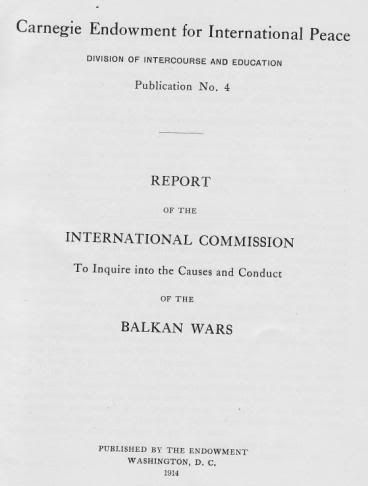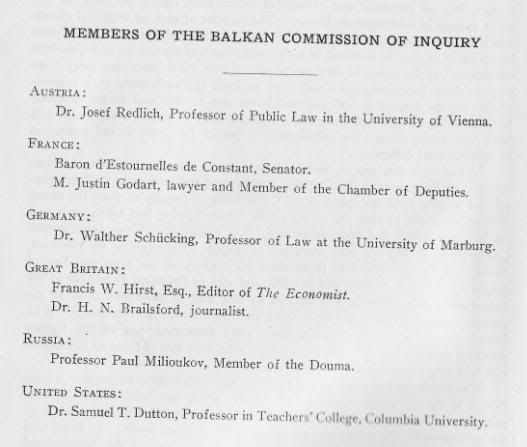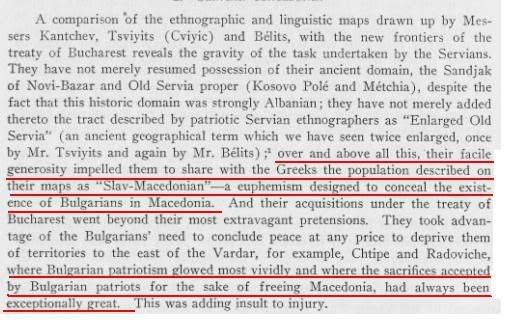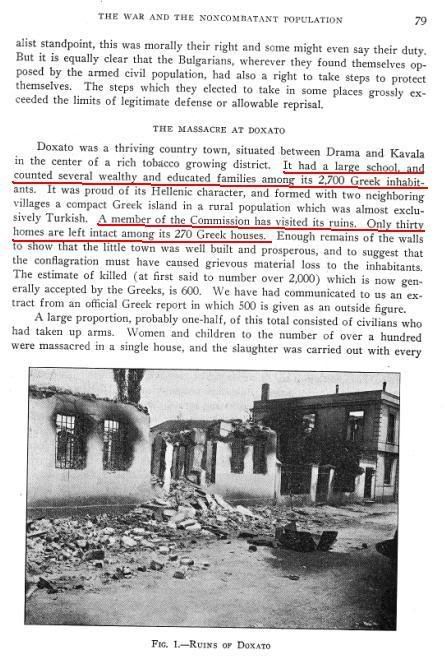

Risto Stefov, who also publishes books under the name "Chris Stefou", has used the 1914 Carnegie Commission Report on the Balkan Wars as a primary reference for many of his articles. He has written a whole series titled "Greek attrocities in Macedonia" which can be found on maknews.com
In these articles Stefov engages in a heavy dose of historical revisionism. He implies that the Carnegie Commission report describes atrocities committed against "ethnic Macedonians" when in fact the report made no mention of any "ethnic Macedonian" population. The fact that the report made no mention of "ethnic Macedonians" does not phase Stefov who shamelessly converts the Bulgarians the report described into "ethnic Macedonians". Stefov retrospectively molds the population descriptions found in the report to adhere to his nationalist historiography. He and his followers imply that the reason the report described "ethnic Macedonians" as Bulgarians was because the authors of the report were categorizing by religious affiliation. Their theory suggests that because 'ethnic Macedonians' attended the Bulgarian church (Exarchy) they were described as Bulgarians.
The report demolishes this theory in 2 ways:
1. The report makes it clear that those who attended the Bulgarian church were of Bulgarian nationality. If these people were actually "ethnic Macedonians" why would the authors of the report make the following statement?:

2. The report clearly states that the Serbs were amongst the first to categorize the Slavs of Macedonia as a distinct group from the Bulgarians for political purposes. The authors of the report clearly viewed the Slavic population as Bulgarian despite the claim of Serbian scholars who attempted to distinguish this group from the Bulgarians in order to diminish Bulgaria's claim to the region:

It should be sobering for Stefov's readers to actually read the pages of the report and to see for themselves how the "ethnic Macedonians" Stefov describes in his articles were actually recorded as Bulgarians by the international commisison. As an example Stefov goes into length describing attrocities committed in Kukush by the Greek army. This is how the actual report describes Kukush:


Regardless of Stefov's attempts to focus only on the actions of the Greek army in order to demonize the Greek state as much as possible, the fact is that the 1914 Carnegie Commission report also describes atrocities committed by the other combatants. As an example this is an excerpt from the report which describes the massacre of Greeks in the Greek town of Doxato:

The report was published during an era when the "Macedonian" ethno/national identity was still in it's infancy stages. The report provides the reader with valuable contemporary insight into how contemporary geopolitical dynamics fostered the notion that the Slavs of the region were a distinct ethnic group. Up to the period of the Balkan Wars the Slavic population of the region was largely regarded as Bulgarian. The 1914 Carnegie Commisison report was authored by an international commission that spent time in the region. Their observations of the Slavic population of the region concurs with a vast number of other contemporary first hand accounts . Stefov and his nationalist cronies engage in a dishonest practice when they misrepresent the commission's first hand observations and reconstruct the Bulgarians described in the report as "ethnic Macedonians".
Implying that the Carnegie Commission failed to record what Stefov et al allege was the largest ethnic group in the region is akin to a modern international commission going into Palestine and not recording any Palestinians!
No comments:
Post a Comment